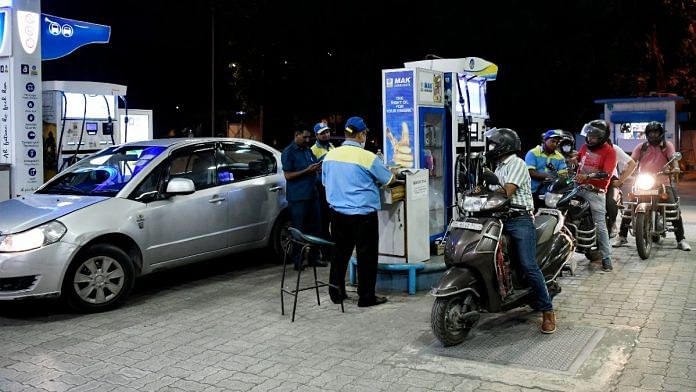New Delhi: Even though several current global events could likely increase oil prices, India will not be significantly impacted due to the deals it has already signed, and also because the economy is now more resilient to such external shocks, according to economists.
Late last month, the US eased sanctions on oil-rich Venezuela by allowing Chevron Corporation to export oil from there. This increased supply in the medium term was expected to see oil prices ease over the next few months.
However, more recent events could play spoilsport by keeping global oil prices up. On Sunday, the Organization of Petroleum Exporting Countries (OPEC) agreed to maintain the oil production cuts implemented in their October meeting.
In addition, news that China was easing some of its Covid curbs has led to an increase in oil prices in anticipation of increased demand from the Asian giant. Further compounding these developments is the fact that Russia has warned that it would not sell oil to countries that accept the European Union-backed price caps.
However, India is not likely to be heavily impacted by these developments because it is already importing discounted oil, and will continue to do so, Vibhuti Garg, South Asia Director of the Institute for Energy Economics and Financial Analysis (IEEFA), told ThePrint.
“My sense is that India is going to continue importing discounted oil from Russia and Russia is coming up with its own fleet of ships,” Garg said. “Earlier they were using European cargo ships to export oil, but now they are building up their own fleet.”
“So, the price pressure point of Europe imposing additional charges on Russia on insurance and freight because of the sanctions will be relieved, and Russia can continue selling oil to countries like India at cheaper prices than the market,” she explained.
Russia’s development of its own fleet of ships comes at a time when the EU has been trying to make it more expensive for Russia to use European ships to transport its oil.
Also Read: Indian refiners wary of buying Russian oil after 5 Dec when EU sanctions take effect, says report
Russian benefit for India
“India is a very price sensitive economy and it has a very high import requirement for oil, so if it is getting cheaper oil from Russia, it will continue importing from them,” Garg added.
This sentiment has been affirmed by India repeatedly, with finance minister Nirmala Sitharaman, external affairs minister S. Jaishankar, and petroleum minister Hardeep Puri each defending the decision to continue importing cheap oil from Russia.
Apart from this, developments in its economy itself are serving to partially insulate India from the flight of capital that developing countries usually face when business conditions turn adverse, according to Dhruv Sharma, senior economist at the World Bank.
“We are already seeing oil prices, which had surged, slowing just a bit,” Sharma told ThePrint. “Our estimate is that a $10 increase in the price of crude oil will increase India’s current account deficit by one percentage point.”
“However, this could have been much worse for India,” he added. “What’s been happening is that the share of foreign direct investment (FDI) has increased in the overall investments, which has meant these are more secure and likely to stay.”
The reason for this is that it is relatively easier to take out foreign portfolio investments — which are largely flows of money — from the country than it is to take out FDI, which is in the form of actual physical infrastructure like factories and plants.
Possible advantage in Venezuela
Experts said India is one of the few countries in the world that could take advantage of the easing of sanctions on Venezuela.
“The Reliance refinery in Jamnagar is one of the few in the world that can process heavy crude oil, which is largely the kind of oil that Venezuela specialises in,” an oil industry official told ThePrint. “This can certainly be of advantage to India.”
“If India is able to crack a deal with Venezuela on favourable terms, then that will be another factor that could help ease prices,” Garg said.
On 27 November, the Biden administration decided to ease some sanctions imposed by the Trump administration by allowing California-based Chevron to resume business in Venezuela.
In January 2019, the Donald Trump administration had imposed sanctions against Venezuela’s state-owned oil company Petróleos de Venezuela. This was in response to Venezuelan President Nicolas Maduro’s victory in the 2018 re-election, which Washington termed a “sham”.
Ostensibly, the easing of sanctions was in response to a decision by the Maduro government and the opposition to sign a humanitarian agreement. This action is part of a “longstanding US policy to provide targeted sanctions relief based on concrete steps that alleviate the suffering of the Venezuelans and support the restoration of democracy”, said the US Treasury Department.
But the timing of the easing of sanctions has been viewed with suspicion, as leading observers argue that it was done more in order to ease oil prices and inflation than to “alleviate the suffering of the Venezuelan people”.
The decision comes amid a global oil supply crunch triggered by the Ukraine war and weeks after the OPEC+ agreed to an oil production cut — a move that irked Biden.
Washington’s decision to ease sanctions on Venezuela also comes eight months after Biden received bipartisan backlash for sending a high-level delegation to the South American country reportedly to discuss energy sanctions relief.
(With inputs from Pia Krishnankutty)
(Edited by Nida Fatima Siddiqui)
Also Read: Sizzling oil prices burning a hole in your pocket, but refiners are making a killing



